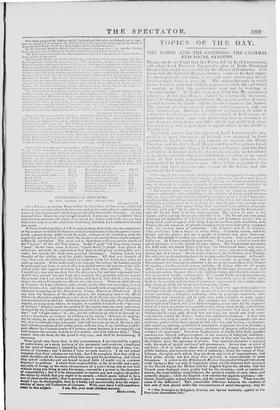CUSTOMHOUSE REFORMS.
TO '11110 sairrott or THE SPECTATOR. Gilt Ain 1°3C. STR-1 have, at various times within the last three or four years, addressed letters to you on the subject of necessary' and practicable reform., and retrench- ments in the departments which manage the collection of the Revenue. As you inserted those letters in your valuable journal, I presume you considered them calculated to promote the object they aimed at ; and as very little has yet been done with respect to the subject to which they referred, 1 ain induced to trouble you again.
Without further preface, 1 will at once declare, that from my own experience
of the manner in which the business of the Customhouse at the out-ports is trans- acted, a great saving might easily be made, without at all interfering with the regularity and despatch with which the business of a customhouse ought undoub- tedlyto be conducted. The great evil is, that there still renntins too much of the " leaven " of the old Tory system. In the " good" old Tory times, (using "good" in the same sense as we say "good devil,") people were placed in situations, not with the expectation that they would prove useful public ser- vants, but merely for their own personal advantage. Nothing indeed was thought of the public, or of the public business. All that was thought of was, that such an individual might he enabled to lay his hands on a salary to such an amount-. If the individual could only get the salary, the business might be performed any how, or not at all ; it mattered not to the patrons of the indi- vidual with the support of whom the public was thus saddled. Now, Sir, I would ask, can any one deny that the above is a fair and true representation ? And if they cannot as sure I am they cannot) they probably will not dispute the general rule I am about to lay down, and that is, that (with a few excep- tions) the oldest Customhouse officers are—the worst. Many an old Collector of Customs do I myself know, who attends at his office not more than two or three hours a day, and then only to amuse himself with a superficial glance at whatever is amusing in the Standard or Times, Fraser or Rlachwood. Bat any time the business of the office presses, the managing man— the Read Clerk—is allowed to apply for an extra clerk, the Collector signs the application, and an extra clerk is allowed. linked an extra clerk is frequently allowed without inquiry, in many cases where, out inquiry., it would be found that the "pressure of business" which is made the ground of the application for extra assistance, is caused by the Collector's employing his clerks in the collection of " Harbour dues" and "Light duties" &c. &c.iThr the collection of which he himself re- ceives a handsome percentage in addition to his salary although, by employ- ing his clerks, he makes the public pay for all the trouble of collection. Now, Sir, this is a literally true statement ; and will not you, as one of the most able and vigilant guardians of the public purse, will not you, I say, bid those highly- paid officers the Commissioners of Customs, whose business it is to regulate and well manage the service, to look to this matter, and that without delay? They cannot deny the facts, for the proof is very easy, and shall be forthcoming, if necessary.
Some people may fancy that, in this remonstrance, I am actuated by a spirit of malevolence, or a mean jealousy of the prosperity and comforts, (unalloyed by the cares of business,) enjoyed by that most respectable class of men, Col- lectors of Customs ; but I declare I have no such. motives. I do not indeed complain that their salaries are too high, but I do complain that they shift on other shoulders all the business which they are paid for performing, and which they indeed undertake and are bound in good faith (I might say in common honesty) to perform. I admit their respectability, so far as wealth and a gen- teel style of living, or the mere circumstance of a man's being able to live well Without doing any thing to earn his money, can entitle a person to the character of respectability ; but if it be disreputable to receive pay and neglect altogether the duties by which that pay ought to be earned,—which seems indeed to be a sort of cheat on the public, that in private cases, is summarily remedied,—if this Would I say, be disreputable, then do I boldly and unreservedly deny the respec- tability of many old Collectors of Customs. With your leave I Will sometimes recur to this subject. I am, Sir, your most obedient servant, MERCATOR.


























 Previous page
Previous page